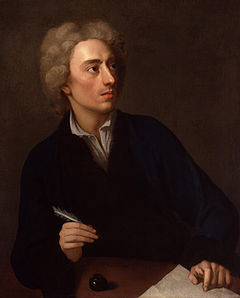Pope, Alexander: Prologue to Mr. Addison’s Cato*
Prologue to Mr. Addison’s Cato* (English)To wake the soul by tender strokes of art, To raise the genius, and to mend the heart; To make mankind, in conscious virtue bold, Live o'er each scene, and be what they behold: For this the Tragic Muse first trod the stage, Commanding tears to stream thro' ev'ry age: Tyrants no more their savage nature kept, And foes to virtue wonder'd how they wept. Our author shuns by vulgar springs to move The Hero's glory, or the Virgin's love; In pitying Love, we but our weakness show, And wild Ambition well deserves its woe. Here tears shall flow from a more gen'rous cause, Such tears as patriots shed for dying laws. He bids your breasts with ancient ardour rise, And calls forth Roman drops from British eyes: Virtue confess'd in human shape he draws, What Plato thought, and godlike Cato was: No common object to your sight displays, But what with pleasure Heav'n itself surveys, A brave man struggling in the storms of fate, And greatly falling with a falling state. While Cato gives his little senate laws, What bosom beats not in his country's cause? Who sees him act, but envies ev'ry deed? Who hears him groan, and does not wish to bleed? Ev'n when proud Cæsar, midst triumphal cars, The spoils of nations, and the pomp of wars, Ignobly vain, and impotently great, Show'd Rome her Cato's figure drawn in state; As her dead father's rev'rend image past, The pomp was darken'd, and the day o'ercast; The triumph ceas'd, tears gush'd from ev'ry eye, The world's great Victor pass'd unheeded by; Her last good man dejected Rome ador'd, And honour'd Cæsar's less than Cato's sword. Britons, attend: be worth like this approv'd, And show you have the virtue to be mov'd. With honest scorn the first famed Cato view'd Rome learning arts from Greece, whom she subdued; Your scene precariously subsists too long On French translation and Italian song. Dare to have sense yourselves; assert the stage; Be justly warm'd with your own native rage: Such plays alone should win a British ear As Cato's self had not disdain'd to hear.
|
Prológus Mr. Addison Cato című tragédiájához (Hungarian)Művész-szóval ébreszteni az elmét, hogy szellem támadjon, szív nemesedjék, s az ember, míg a színről megragadják az erények, azzá legyen, mit ott lát - a színpadon ezért jár Melpomene könnyet fakasztva már sok ezredéve, s szelidült szíve ádáz zsarnokoknak, gonosztevők önkéntelen zokogtak. Szerzőnk olcsó fogással hatni átall, szűz szerelemmel, harci glóriával; szerelmest szánni gyöngeség jele; ki túl merész, méltán bukik bele. Itt nemesebb ügyért hull könny, minőt hazafi ejt a holt Törvény előtt; antik tűzzel gyújtja a kebleket föl, s római könnyet csordít brit szemekből. Erényt rajzol ő emberi alakban, Platón-eszményt: Catót, a halhatatlant. Oly fennkölt tárgyat tár előnkbe, mint melyet az Ég is tetszéssel tekint, nagy embert, küzdve a sors viharával, s hősként bukva az elbukó Hazával. Míg szenátusban törvényt hozni ül, van szív, mely szent honáért nem hevül? Tetteitől ki nem buzdul erényre? Hallván jaját, ki nem vérezne érte? Midőn Caesar nagy diadalmenetben – hitvány-hiú, nagyhangú-tehetetlen – sok összerablott préda közepette Cato képmását csúfságra vitette, a pompa húnyt, elsötétült a nap, ahogy a hon holt atyja elhaladt; ujjongás szűnt, kövér könnyek peregtek, a hódítóra ügyet sem vetettek; utolsó nagyjáért sírt Róma népe, s nem Caesar kardját, Catóét dicsérte. Brit nép, légy méltó ilyen épüléshez, s mutasd ki: vagy még meghatódni képes. Hisz Cato nemes gúnnyal nézte, Róma hogy tanul Hellásztól – hódoltatója; színpadunkon sem él régóta más, olasz ének, francia forditás. Segítsd szinházunk: bátran légy magad. hevítsen az itthoni indulat: brit fülnek ily színmű tessék, amelyre maga Cato is szívesen figyelne.
|




